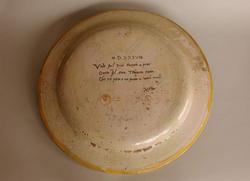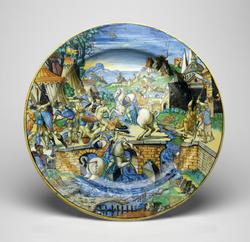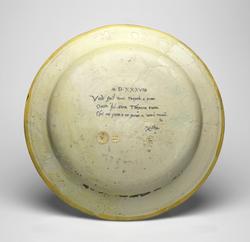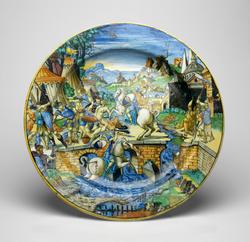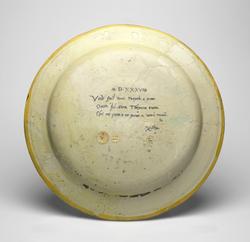Current Location: In storage
Titles
Horatius Cocles holding the Bridge against the Etruscans
Maker(s)
Painter:
Avelli, Francesco Xanto
Printmaker:
Dente, Marco (Marco da Ravenna)
(After)
Printmaker:
Raimondi, Marcantonio
(After)
Entities
Categories
Description
Maiolica dish, painted in polychrome with Horatius Cocles holding the Bridge against the Etruscans.
Buff earthenware, tin-glazed overall; the reverse is pale beige and has crawled near the lower edge. Painted in blue, green, yellow, orange, stone, brown, manganese-purple, black, grey, and white.
Shape 64, with three faint concentric grooves under the edge. Circular with a narrow rim and wide flat centre; the base uneven.
Horatius Cocles holding the Bridge against the Etruscans. On the right, three men are breaking down the bridge with picks. In the middle, Horatius, mounted on a rearing charger, brandishes his sword at a group of ten attackers. Below the bridge, there is another mounted Roman, whose horse's rump has been pierced by an arrow fired by a bowman on the left. Both he and Horatius bear shields charged with the arms per fess argent and azure the base of a column proper. In the foreground there are rocks, a broken-down fence and the river Tiber; in the background to left, the tents of the Etruscan camp, and to right, Rome and distant mountains. The rim is yellow. The back is inscribed in the middle, in dark blue: '.M.D.XXXVIII./Vedi su'l pontei trepido, e, feroce/Oratio sol cotra Thoscana tutta/Che ne ferro, e, ne fuoco a vertu nuoce./.Xato.' (Behold on the bridge the intrepid, and, fierce Horatius alone against all the Etruscans Who neither with iron nor fire harm his valour. .Xanto.) A narrow black band and a wider yellow band encircle the edge.
Notes
History note: Purchased in 1920 by F. Leverton Harris.
Legal notes
F. Leverton Harris Bequest, 1926
Measurements and weight
Diameter: 46 cm
Height: 4.7 cm
Acquisition and important dates
Method of acquisition: Bequeathed
(1927)
by
Harris, F. Leverton, The Right Hon.
Dating
16th Century
Renaissance
Production date:
AD 1538
: dated
Note
None of these sources indicate that Horatius fought on horseback, so the representation on the dish is artistic license on Xanto's part. Horatio is also shown on horseback on a dish inscribed with the same line from Petrarch, and dated 1541, in the Palazzo di Venezia, Rome. As was his usual habit, Xanto created the scene partly by drawing the figures from several different printed sources: the 'Abduction of Helen', engraved by Marcantonio Raimondi after Raphael; 'I Modi' engraved by Marcantonio Raimondi; the' Battle of the Romans and Carthaginians' by Marco Dente (?) after Raphael or Giulio Romano; the 'Battle with a Cutlass' by Marco Dente (?) 'and, possibly, the 'Slaying of Cerberus' by G.G. Caraglio after Rosso Fiorentino, and 'St George and the Dragon' by Master I.B. with Bird. The city in the background features anachronistically two obelisks, which Xanto incorporated into other scenes to indicate a location in Rome or elsewhere in the Ancient World. For details of the prints, see the Documentation, Poole, 1995.
The story of Horatius defending the bridge against the Etruscans is related by the Roman historians, Livy in Ab urbe condita, II, X, and by Valerius Maximus, in Facta et dicta memorabilia, III, ii, 1, which was certainly known to Xanto, probably in the translation by Agostino de Taie da Portese, Valerio Masimo volgare nuovamente correcto, Venice, 1509, or a later edition, such as by G. Gregori, Venice, 1526. However, the inscription on the back of the dish was not drawn from either of these classical sources, but partly from Petrarch's Trionfo della fama, I, 41-2. Xanto used an edition with commentary by Ilicino, who provided a very brief description of Horatius' bravery. In that text, 'Oratio sol contra Thoscana tutta/ Che ne foco, ne ferro a vertu noce' follows 'Mutio che la sua dextra errante coce' versions of which appear on dishes decorated by Xanto with Mucius Scaevola scorching his right hand in front of Lars Porsenna, such as the Fitzwilliam's dish C.12-1953.
School or Style
Renaissance
People, subjects and objects depicted
Components of the work
Decoration
composed of
high-temperature colours
( metallic oxides producing blue, green, yellow, orange, stone, brown, manganese-purple, black, grey, and white)
Materials used in production
buff
Earthenware
Tin-glaze
Techniques used in production
Tin-glazing
: Buff earthenware, tin-glazed overall; the reverse is pale beige and has crawled near the lower edge. Painted in blue, green, yellow, orange, stone, brown, manganese-purple, black, grey, and white.
Inscription or legends present
Inscription present: circular museum label
- Text: M 76
- Method of creation: Inscribed in ink
- Type: Label
Inscription present: circular
- Text: 244/az
- Method of creation: Inscribed in ink
- Type: Label
References and bibliographic entries
Related exhibitions
Identification numbers
Accession number: C.55-1927
Primary reference Number: 75499
Stable URI
Audit data
Created: Saturday 6 August 2011
Updated: Tuesday 30 April 2024
Last processed: Wednesday 14 May 2025
Associated departments & institutions
Owner or interested party:
The Fitzwilliam Museum
Associated department:
Applied Arts
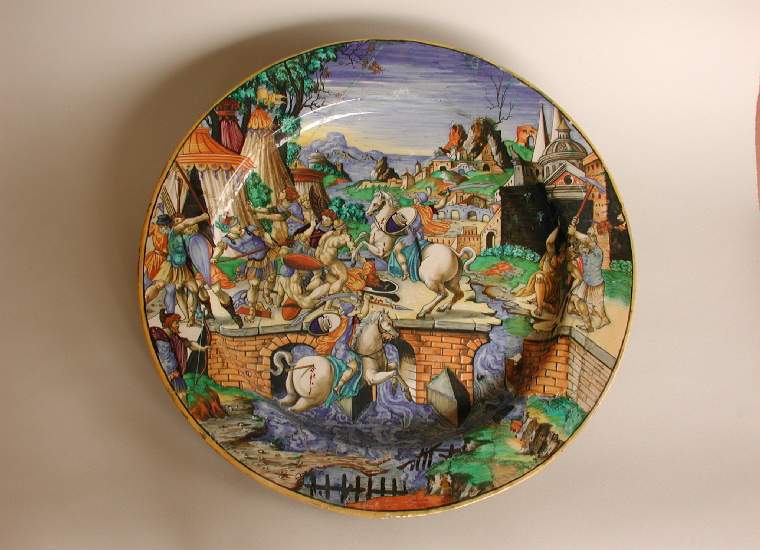
 IIIF Manifest
IIIF Manifest
